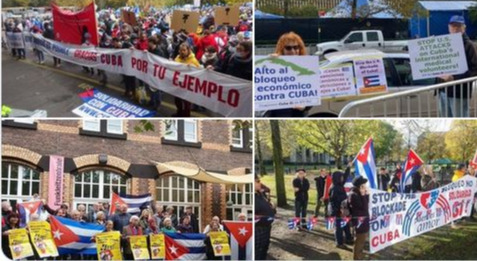
Havana, November 1 (RHC) Cities in more than 30 countries saw this weekend activities to demand an end to the blockade that the United States has maintained for six decades and is intensifying today against Cuba.
The demonstrators denounced the destabilizing campaigns orchestrated mainly from that northern power to bring about a regime change and interrupt the process of transformations promoted by the island since 1959.
Members of solidarity groups, people of goodwill, and Cubans residing in countries of various latitudes carried out marches, car, and bicycle caravans, rallies, cultural meetings, and debates in social media networks.
On Sunday, the solidarity initiative Puentes de Amor (Bridges of Love) carried out a mobilization in Washington demanding U.S. President Joe Biden to lift the sanctions to crush the Cuban family and hinder the country's development.
Similar actions took place in San Francisco, New York, Chicago, Albuquerque, and Minnesota, among other U.S. cities. In Ottawa and Vancouver, Canada, car, and bicycle rallies were held on Saturday in support of Cuba.
The call had a particular response in Latin America and the Caribbean, in Trinidad and Tobago, Venezuela, Paraguay, El Salvador, Panama, Dominican Republic, Nicaragua, Brazil, and Mexico.
In the latter, the José Martí Association of Cuban Residents issued a statement. It described the blockade as genocide and demanded the immediate lifting of that siege and an end to the aggression against the island. ‘
From Italy, Austria, Belgium, Finland, and Germany, among other European nations, actions were also reported this weekend, at the closing of the Tenemos Memoria (We Have Memory) day, organized by the Cuban Institute of Friendship with the Peoples against terrorism and the blockade.
Dozens of British activists and Cubans living in the United Kingdom came from London and Birmingham to the port city of Bristol to demonstrate their support for the right of this Caribbean nation to its independence, sovereignty, and self-determination.

